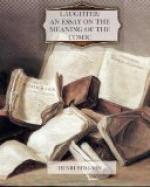Above all, a tragic poet will never think of grouping around the chief character in his play secondary characters to serve as simplified copies, so to speak, of the former. The hero of a tragedy represents an individuality unique of its kind. It may be possible to imitate him, but then we shall be passing, whether consciously or not, from the tragic to the comic. No one is like him, because he is like no one. But a remarkable instinct, on the contrary, impels the comic poet, once he has elaborated his central character, to cause other characters, displaying the same general traits, to revolve as satellites round him. Many comedies have either a plural noun or some collective term as their title. “Les Femmes savantes,” “Les Precieuses ridicules,” “Le Monde ou l’on s’ennuie,” etc., represent so many rallying points on the stage adopted by different groups of characters, all belonging to one identical type. It would be interesting to analyse this tendency in comedy. Maybe dramatists have caught a glimpse of a fact recently brought forward by mental pathology, viz. that cranks of the same kind are drawn, by a secret attraction, to seek each other’s company. Without precisely coming within the province of medicine, the comic individual, as we have shown, is in some way absentminded, and the transition from absent-mindedness to crankiness is continuous. But there is also another reason. If the comic poet’s object is to offer us types, that is to say, characters capable of self-repetition, how can he set about it better than by showing us, in each instance, several different copies of the same model? That is just what the naturalist does in order to define a species. He enumerates and describes its main varieties.
This essential difference between tragedy and comedy, the former being concerned with individuals and the latter with classes, is revealed in yet another way. It appears in the first draft of the work. From the outset it is manifested by two radically different methods of observation.
Though the assertion may seem paradoxical, a study of other men is probably not necessary to the tragic poet. We find some of the great poets have lived a retiring, homely sort of life, without having a chance of witnessing around them an outburst of the passions they have so faithfully depicted. But, supposing even they had witnessed such a spectacle, it is doubtful whether they would have found it of much use. For what interests us in the work of the poet is the glimpse we get of certain profound moods or inner struggles. Now, this glimpse cannot be obtained from without. Our souls are impenetrable to one another. Certain signs of passion are all that we ever apperceive externally. These we interpret—though always, by the way, defectively—only by analogy with what we have ourselves experienced. So what we experience is the main point, and we cannot become thoroughly acquainted with anything but our




